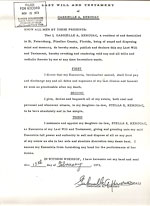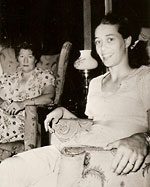And The Beat Goes On
A forged will sends Jack Kerouac scholars, fans, collectors, literary executors, and lawyers on the warpath. By Stephen Maughan
When Jack Kerouac wrote his will shortly before his death in 1969, he was broke. Forty years later, a ferocious battle rages over his multi-million dollar literary estate. Kerouac, at odds with his third wife, Stella Sampas, had left everything to his mother, Gabrielle Kerouac. But when Gabrielle Kerouac passed away in 1973, her will indicated that the entire estate would go to Sampas, news that had shocked Kerouac’s remaining blood relatives—his daughter, Jan, and his nephew, Paul Blake Jr. When Sampas died in 1990, her siblings inherited the Kerouac literary estate, with the youngest brother, John Sampas, acting as executor. It was a stunning series of events for Kerouac scholars and fans, but the real surprise was yet to come. Last July, a judge in Tampa, Florida ruled that Gabrielle Kerouac’s 1973 will was a forgery.
Gerald Nicosia, author of the acclaimed Kerouac biography, Memory Babe, first suspected foul play in 1994, when Jan Kerouac saw a copy of the will for the first time and noticed that her grandmother’s name was misspelled.
“We are dealing with perhaps the most influential American novelist of the twentieth century, after all, and it is now proven that his $30 million estate was stolen, plain and simple,” said Nicosia.
The Sampas family was not directly involved in the July hearing, but John Sampas disagreed with the verdict.
“We do not believe the will of Gabrielle Kerouac was forged and do believe the judge based his ruling on fictitious accounts by a doctor who never met Gabrielle Kerouac,” he wrote in a recent email.
For Paul Blake Jr., now 61, who rarely speaks publicly, the court decision must offer some consolation. He has long claimed that his uncle Jack posted him a letter the day before he died in which the famous author wrote, “I've turned over my entire estate to Memere (Mummy), and if she dies before me, it is then turned to you, and if I die thereafter, it all goes to you.” Kerouac’s letter said he wished to leave it “to someone directly connected with the last remaining drop of my direct blood line … and not to leave a dingblasted fucking thing to my wife’s one hundred Greek relatives … Just telling you the facts of how it is.” The letter, dated October 20, 1969, and addressed to “My little Paul,” also declares that Kerouac was intending to divorce his wife (indeed, he had already begun divorce proceedings) and concludes, “I want you to know that if you’re a crazy nut you can do anything you want with my property if I kick the bucket because we’re of the same blood.”
Blake, who was desperate for money, sold that letter to art dealer Alan Horowitz in order to make ends meet. Horowitz then sold the letter to the New York Public Library, where it remains to this day in the Henry W. and Albert A. Berg Collection of English and American Literature. The Sampas family insisted the letter itself was a forgery, and Gabrielle’s will remained unchallenged for more than two decades. In 1994, after Jan Kerouac first noticed the misspelling on Gabrielle’s will, she then took a trip to Florida to interview the surviving witness to the will and filed a lawsuit. Blake was missing at that time and so could not join her. Before the case made it to court, Jan died from kidney failure in 1996.
Following Jan’s death, Blake was the only known surviving Kerouac blood relative. He pressed forward with the forgery case. During this time Blake was in a bad way, often homeless, struggling with alcoholism and poverty. This meant that his lawyer, Bill Wagner, later joined by his son Alan, were not only at the forefront of an extensive probate battle, but for a great deal of this time, they were unable to even locate their client. Despite these obstacles, the ruling in July 2009 by Judge George W. Greer in the sixth Judicial Circuit Court in Tampa, Florida declared that the original will was not signed by Gabrielle Kerouac, and was therefore a forgery.
Greer, in an eleven-page statement, stressed “Gabrielle Kerouac was not a well woman when her purported will was signed; She could only move her hand and scribble her name. She would have lacked coordination to affix that signature.” This raises the question—who forged the document, and why? Greer refused to explore that possibility, stating that the Court was not required to determine whose signature it was, but “It is enough that Gabrielle Kerouac did not herself sign it.” According to John Sampas, though, “Judge Greer based his decision on fiction, his hearing was a charade, a kangaroo court.”













